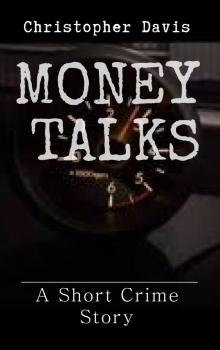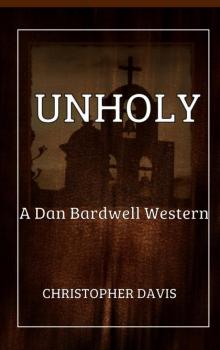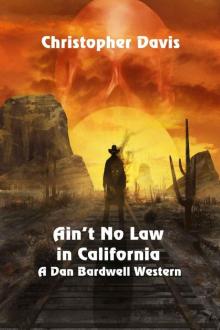- Home
- Christopher Davis
Ain't No Law in California Page 2
Ain't No Law in California Read online
Page 2
There was nothing left of the vehicles that a man could use. Once the bombs started to go off, most of their contents were vaporized. Not to mention the men, women, and children that had occupied them. Anything useful that could be carried off had been taken long ago by those before him.
A large dead manzanita near an outcropping of rock provided hope for the weary traveler. The lawman bent to collect an armload of broken sticks for a fire. Although Bardwell knew well that he could make it without, a small fire would boil coffee and keep the coyotes at bay.
In places, the sand had been fused solid from the heat during the initial blast. Bones were among the dead sticks and branches of the manzanita against the rock. The lawman turned for a look back at the cars nearby. This family or group of travelers had managed to exit their vehicles and get to the safety the rock provided before death came calling here in this lonely place.
The bones he pushed aside in hope of keeping this ancient family together, if that is what it was, a family? A metallic glint caught his eye as he bent to fill his arm. Several pieces of silver along with a few copper pieces were just under the blown sand. These, the lawman retrieved and tucked away in his shirt pocket for later inspection. For the moment, a fire was his main requirement out here in the badlands.
Bardwell’s saddle and bedroll lay to the leeward side of a large rock that would provide protection from the fierce winds known to blow out here on the prairie come nightfall.
With the journey still ahead, Bardwell wouldn’t remain awake long into the night. The lawman struck a small fire and started the first can of coffee for the evening.
Camp chores accomplished, he fashioned a simple torch and walked back to where the dead manzanita and bone lay along the long forgotten road.
Bardwell kicked around the top inch or so of dust and sand, exposing a few more pieces of silver. Each of the rusting vehicles contained more. Fire had long ago consumed anything usable from the interior with the exception of the coins. It seemed that no one had been to this lonely place from the time the bombs had fallen.
At his fire, the lawman poured a dented cup full of a bitter black brew. In some places, the beverage would pass for coffee. As the horses grazed quietly Bardwell watched as the flames licked the dried wood. Coyotes—one of the only animals to inhabit the borderlands—yelped and howled in the distance. The tin star lawman lay back against his saddle and closed his eyes for the night.
***
To the east and north, the daystar clawed its way into a nuclear morning sky just as gray as gunmetal and lighting the undersides of distant ash clouds in yellow, pink, and orange. Leaning steel towers the ancients had once used for communication marked the path Bardwell reckoned his travels would follow for the day. Heavy cable dropped in places to the ground nearly touching the desert chaparral and colorful manzanita.
The lawman stoked his small fire and walked once again to the forgotten macadam for one last look around before departing from this place left to the ages.
Across the path leading north, the vehicles were in the same shape as those that once headed south. A few pieces of silver and a few more of copper were found in each. In one Bardwell found an ancient weapon of some sort. The lawman looked over the sleek cylinder-less firearm. COLT was stamped in the ancient steel 1911 .45. The Colt had once had grips of rubber or plastic the lawman reckoned. This along with the handful of coins, he carried back to his saddlebag. Someone must have parts or knowledge of the weapon. If not, it would be trading material with some of the badlands tribes that frequented the desert west.
With the horses saddled and his belongings packed, the lawman swung a leg over for another long day in the saddle. To the east, the first glimpse of the new day was rising just over the distant range of mountains. Bardwell gave a nervous glance at his timepiece. It was just past five.
Miles of nothing but wasteland went by without sound here on the barren prairie. Two or three times during the morning buzzards circled high overhead and off to the east.
Bardwell wondered if something had come along to hold up the travels of his partner, to make him late for the intended rendezvous later in the day.
Mostly his mind drifted to the pretty young woman at the cantina, the little boy, and the old couple. Had her name indeed been Maria? Had she worked behind the bar for the longest time? Was the child hers?
These were all questions that the lawman would never know the answer to. Yeah, maybe in time, he’d ride through trailing another bandit or hombre of some sort. One thing for sure—in this line of work—there was always more of the mean kind. They might hide under a rock, but try as they might, they’d be forced to step out at some point in time.
An ancient bridge spanning a great dry gorge had crumbled into the abyss. Bardwell guided his mount along a narrow trail to the bottom. The lawman tried to picture in his mind what this country had once looked like with its population traveling the concrete highways from city to city, what this river might have looked like as it flowed to the ocean. His teachings as a child had said that this was once a great agricultural empire, the vegetable garden of the world.
Now the land was dry and barren, windblown and grew nothing but trouble for anyone having to pass.
Ahead a low mountain range was all that separated the lawman from the once great city beyond. Somewhere along the way, he would be crossing paths with his partner. The lawman looked forward to seeing the boy…well, young man again. It had been some time since they had last spoken.
Bardwell thought of Sweetwater—where the water was anything but—and the Methodist preacher man—Luke Fisher—and his whiskey drinking ways. Fisher was good with a gun and Bardwell had always liked the gentleman.
The lawman had ridden into town two days ahead of Norberto Montez and his partner Angel Rivas. Montez was wanted for the murder of a Sacramento banker. Rivas was wanted for eating the man’s heart as he lay dying in the street.
Bardwell had ridden hard and come up ahead of the Mexicans somehow, as they made their getaway. The lawman had taken rest in the dry little river town of Sweetwater. On the morning Montez and Rivas arrived, Bardwell was talking with some of the gentlemen from that place, explaining the sudden violence the pair was known for.
Montez dismounted in the street leading his mount to a rail fronting the only saloon within miles. Rivas rode right along the raised walk shooting into a glass sky overhead. Three other dark riders—whom the lawman didn’t know—dismounted further down the street and led their mounts closer. There would be trouble here for sure and hell to pay by someone.
Bardwell had done what he could to caution the folks of the tiny hamlet here in the middle of nowhere, now it was time to do his job.
“Norberto Montez, Angel Rivas,” the lawman said, standing in the one dusty street leading through town, “I am glad that you could join me here in Sweetwater, mi amigos.”
“Bardwell,” Rivas laughed, stretching the name with his thick accent. “Amigo, I will cut out your fucking liver and cook it up for dinner tonight.”
The lawman smiled not giving any ground. Montez and Rivas both carried the pistolas of the Mexican bandits, primitive black powder weapons that were anything but quick to load. Montez was the brains of the outfit. Rivas provided shock value to the pair. The others, well…the lawman would soon enough find out. There were nine guns in the hands of five dark and lawless men facing the tin star lawman.
Bardwell would have to be at his best today here in the dusty street running through Sweetwater in what had once been known as California.
“Mi amigo,” Montez said, in a loud voice that echoed between the buildings. “Maybe we could have a drink and talk about this, no?”
“Yes, yes,” Rivas said. “We will drink and talk, but only after I have cut off the head of the Sheriff.”
All five of the Mexicans laughed. None of the town’s residents braved the coming onslaught.
“I am afraid that I will have to enjoy my whiskey alone tonight, amigos,” t
he lawman said, looking straight into the eyes of Rivas. Although Montez was who the lawman was trailing, it was Rivas that he wanted most of all. Montez might be taken alive. Rivas would breathe his last breath here today if the lawman had any say in the matter.
It was Bardwell’s turn to laugh and he laughed the laugh of a lunatic, its sound rising above the rough wood boards of the tiny town.
Spur rowels sang from the street behind the lawman. Bardwell didn’t dare take his eyes from the bandits standing in the street.
“Looks like you could use a hand out here, Son?” the preacher man—Fisher—asked, tossing back the long, black tails of his coat and exposing the Peacemakers at his side.
“Are you sure that you’re up for it, Father?” Bardwell asked. “These men will play for keeps.”
“Oh,” the preacher said, looking skyward with his eyes closed. “The good Lord works in mysterious ways, Son. Now me,” he continued, “I do some of my best work behind these here pistols on my side.”
Bardwell smiled. The preacher’s two long barreled Colts lessened the odds out here under a hot, noonday sun.
“What do you say, gentlemen?” the preacher asked. “Since it has grown rather warm today, how about we all walk over to the saloon there and have us a drink? What do you say?”
“Fuck you, Preacher Man,” Rivas said laughing. The others laughed along also.
Franklin Curtis—the boy—came up along Bardwell’s left stopping in the street with his lever action Winchester over his shoulder just like it was nothing out of the ordinary to face down five gunmen with bad intent.
“Son,” Bardwell said. “Why don’t you just walk back over to the mercantile there and wait this one out, huh?”
“This is my town, Mister,” the boy said. “And ain’t no one going to do no shooting if I ain’t involved in it.”
“Yeah,” Montez shouted. “Why don’t you send your nigger home Sheriff? He might get hurt.”
“I would hate to spill his nigger blood,” Rivas said still laughing. “Run along, nigger boy and let the real men show you how this is done.”
Curtis dropped the rifle from his shoulder chambering a round in the process and winging one of the riders with his first shot.
Bardwell slapped leather, as did Fisher standing alongside, each coming up with a pair of pistols blazing lead and sudden death to the others.
Montez went down with a shot in the leg. The dry lane soaked up the river of red pouring from the Mexican’s severed artery.
The boy dialed in on the three behind. Fisher had made Montez—standing directly in front the object of his fight, while Bardwell zeroed in on Rivas and his big mouth.
Bardwell’s first shot took Rivas by surprise hitting the Mexican in the arm. A superficial wound it could be called. Before Rivas could ever get off his first shot, the lawman had come back with another. This time finding the right wrist and breaking it cleanly.
“Fuck you, Sheriff,” Rivas yelled. He sent up a yell that would wake the dead if not silenced before too long. The Mexican fired a wild shot with his left going harmlessly into the tin roof of the livery behind.
“We’ll just see about that,” the lawman replied. His mind had already been made up. Rivas would breathe his last today. Bardwell fired again and again into his opponent’s chest. Rivas stumbled backward in the dirt.
Franklin Curtis—the boy—cycled that lever like it was going out of style. The first of the dark riders was down, dead in the dusty street. Curtis swung on a second as Fisher fired both of his Peacemakers. Montez was down for the count and more or less out of action after firing his cylinder empty.
“What do you say, Son,” Fisher asked, raising his Colts for another go of it. “Let’s call this off before anyone else gets hurt?”
“Fuck you,” Montez said, in a low voice that was almost inaudible.
The preacher fired twice more into the man and holstered his weapons having finished with what he had come to do.
Bardwell swung his barrels in two directions, one toward Rivas, and the other to the dark man behind. Both hammers dropped at nearly the same time. The first shot tore away most of Rivas’s jaw. The Mexican crumpled to the dirt without a sound.
That second shot found its mark right between the eyes of that dark gunman with the receiver of that bullet falling over backward before his soul even knew that he was dead.
The boy fired one last round. His intended target struggled to get his backup gun. Bardwell finished the chore.
Fisher stood in the street over the man that he had gunned down looking skyward once again. “Our Father that be in heaven,” he said, in the voice of a well-seasoned clergyman. The tails of Fisher’s coat had fallen back to their rightful place concealing the tools of death the preacher carried at his side.
“You okay, Son?” the lawman asked the boy.
“Yes, Sir,” Curtis said, with a smile that Bardwell would grow to know in the coming years. “And you, Mister?”
“I’m good, Son.” The lawman replied, “You did good today boy and I’m damned glad that you decided to offer your hand.”
“Well, gentlemen,” Fisher said, surveying the carnage in the street along with the others who had braved walking out into the daylight now that the danger had passed. “I think we should take us a walk over to the saloon for a cool drink.”
“Father,” the lawman said. “That might be the best damned thing I’ve heard all day?”
Bardwell, the preacher, and the boy had faced down the danger of the five gunmen here in the street. The others could round up the bodies for the undertaker, it was the least that they could do.
“Tequila, por favor,” Fisher announced coming through the batwing doors of the town’s only saloon.
The barkeep looked up at the figures of three gunslingers making their way into his establishment. The piano player stood peering out the bubbled glass window. Some of the working gals seemed to be in a festive mood this afternoon after the excitement of the gun battle in the street.
“You gentlemen?” the barkeep asked.
“Whiskey for me,” Bardwell said, feeling the weight of the tin star on his chest. “And whatever my partner here is having?”
“Whiskey for me, Nicolas,” the boy said, taking a seat at the polished wood bar.
The lawman had his empty Colts on the bar removing a dozen soft lead bullets from his gun belt to reload the almost too hot to touch pistols. Fisher did the same while the boy jacked a dozen rounds up in the long magazine of the Winchester and leaned it next to the bar.
“Tequila and two whiskeys, gentlemen,” the barkeep said. “This one’s on the house, you hear?”
“Thank you, Son,” the preacher said.
“I have a feeling that these three gentlemen will be drinking on the tab of the townsfolk all night?” Arthur Pemberton—the stage-line man—said, laying a few pieces of silver on the bar, followed by another gentleman and another.
“We could use a lawman around these parts,” Fisher said, sipping the Mexican liquor that he preferred.
“I take it that you folks ain’t got no Sherriff around close?” Bardwell replied, turning up his glass.
“Why, hell, Son,” the preacher said smiling, “Everyone knows there ain’t no law in California.”
Bardwell laughed as the barkeep poured his glass full thinking over what the preacher had said.
“Father,” the lawman started. “I may stay on for a few days and rest my horses, but I can’t stay for long. My job is to track the lawless wherever they might run.”
“I understand, Son,” Fisher said, reaching up and placing a hand on Bardwell’s shoulder, “If you ever change your mind, we’d be glad to have you.”
“Thank you, Father,” the lawman said, turning up yet another glass. The conflict was over now. The townsfolk were out in droves to see the gun battle that had played out on their street. Prairie songbirds sang happy tunes. A cool breeze blew across the dry valley cooling the coming evening.
&nb
sp; Chapter Three
That chance meeting seemed so long ago now, to the tired lawman riding south under a relentless western sun. A great concrete viaduct ran empty gathering nothing over the years but blowing sand. Ahead in the mountains, the remains of giant pipes—once used to transport the state’s water from north to south lay in ruins, another reminder of what life out here had once been.
The mare nickered. Bardwell turned to see a small herd of mutant antelope running across the grassy plain.
“You smell water, girl?” he asked. The mare’s ears twitched back and forth, as did the lead horse.
Here at the southern end of the great valley, grasses grew better than seen in miles. A clump of young trees littered the horizon. Bardwell nudged the horse in that direction. If there were trees, there was water the animals needed desperately.
Weathering next to the ancient road, a faded green sign read—Fort Tejon 28 miles.
“If the water’s good, girl,” he said. “We’ll stop here for the night, okay?”
It was still a few miles to the spring fed creek where the good water flowed from the rock and mountain beneath. A rabbit made the mistake of darting across the plain nearby as the lawman approached. Bardwell fired one clean shot and the rabbit rolled to a stop. The lawman stepped to the ground to retrieve his kill, leading the horses the rest of the way.
“What do you think, kids?” he asked, bending to smell the water running over the rocks in the slow running creek.
The horses both splashed drinking in the cool, clean water. Bardwell grabbed up a handful and had a sip himself. The water was good, maybe the best in two hundred miles.
It wasn’t seven yet as the daystar began to descend to the west. Bardwell gathered sticks and branches from under the trees for the night’s fire. If there was water and antelope in the area, there would be predators also.
Bardwell unsaddled his horses and hobbled them both for the night. Grass and cool water were plentiful. He removed his flint from a saddlebag and bit off a plug of tobacco as he started in on the fire.

 Money Talks
Money Talks Vicky's Secret
Vicky's Secret Unholy
Unholy Ain't No Law in California
Ain't No Law in California